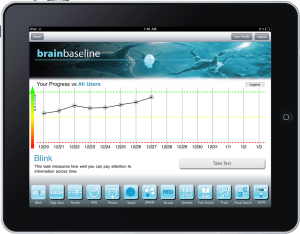Monitoring cognition via mobile applications: iPad app analyzed
 We recently came across a fascinating scientific study, titled Examining cognitive function across the lifespan using a mobile application (Computers in Human Behavior), which studied the value and limitations of using an iPad app called “brainbaseline.”
We recently came across a fascinating scientific study, titled Examining cognitive function across the lifespan using a mobile application (Computers in Human Behavior), which studied the value and limitations of using an iPad app called “brainbaseline.”
Abstract: “Many studies conducted in a laboratory or university setting are limited by funding, personnel, space, and time constraints. In the present study, we introduce a method of data collection using a mobile application that circumvents these typical experiment administration issues…We obtained data from more than 15,000 participants and replicated specific patterns of age-related differences in cognition…we also examined the processing speed account of age-related cognitive differences, and the association of exercise and leisure activity with cognitive function across the lifespan. We discuss the relative advantages and disadvantages of data collection with a mobile application, and provide recommendations for the use of this method in research…Cognitive performance reached an asymptote during young adulthood, and then declined gradually. ? Processing speed mediates the relationship between age and cognitive performance. ? Exercise had a positive association with processing speed. ? Video game experience had different associations with younger and older adult’s memory and attention.”
An even more interesting question–outside the scope of this particular study–is when and how will mobile and/ or online applications enable consumers and patients monitor their own cognition and brain health, as we discussed at the 2012 SharpBrains Virtual Summit during the panel “How can empowered consumers monitor their own brain health? A missing piece in today’s health toolkit is the ability for end-users to quantify and monitor their cognitive and emotional self. Given growing self-tracking and self-care activity, often with questionable value, and significant interest in an “annual mental checkup”, the question arises: What methodologies and instruments may help healthy users meaningfully monitor their own brain health and performance?”


